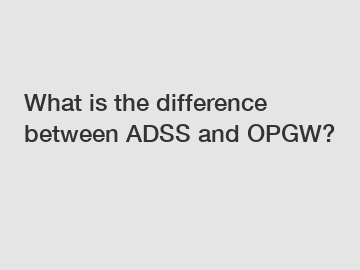Mar. 10, 2024
Electrical Equipment
huaneng contains other products and information you need, so please check it out.
When it comes to the world of fiber optic cables, there are two main types that are commonly used for overhead transmission lines: ADSS (All-Dielectric Self-Supporting) and OPGW (Optical Ground Wire). While both of these cables serve the same basic function of transmitting data through optical fibers, there are some key differences between the two that make them suitable for different applications.
ADSS cables are designed to be installed on overhead transmission lines without the need for a separate messenger wire for support. This means that they are made entirely of dielectric materials, such as fiberglass and aramid yarn, which allows them to support their own weight without the need for a metal conductor. This makes ADSS cables ideal for use in areas where installing a messenger wire would be difficult or impractical, such as in densely populated urban areas or across bodies of water.

On the other hand, OPGW cables are designed to be installed on overhead transmission lines as a grounding wire, in addition to providing a pathway for optical fibers. This means that OPGW cables are made up of both optical fibers and a central metal conductor, typically made of aluminum or steel. The metal conductor in OPGW cables serves the dual purpose of providing electrical grounding for the transmission line and supporting the weight of the cable itself.
One of the key differences between ADSS and OPGW cables is their construction and design. ADSS cables are typically lightweight and flexible, which makes them easier to install and handle compared to OPGW cables. This flexibility also allows ADSS cables to be installed on existing transmission lines without the need for any additional support structures, which can help reduce installation costs and time.
In contrast, OPGW cables are more rigid and heavier due to the presence of the metal conductor. This can make them more difficult to handle and install, especially on long transmission lines or in areas with challenging terrain. However, the presence of the metal conductor in OPGW cables makes them more durable and resistant to environmental factors like lightning strikes and high winds.
Another important difference between ADSS and OPGW cables is their cost. ADSS cables are typically more cost-effective than OPGW cables, primarily because they do not require a separate messenger wire for support. This can make ADSS cables a more attractive option for budget-conscious projects or installations where minimizing costs is a priority.
However, despite their higher cost, OPGW cables offer a number of advantages that make them the preferred choice for certain applications. For example, the presence of the metal conductor in OPGW cables provides a reliable path for electrical grounding, which can help protect the transmission line from power surges and lightning strikes. This can be particularly important in areas prone to severe weather or high levels of electromagnetic interference.
In addition, OPGW cables are typically better suited for long-distance transmission lines or high-voltage applications, where the added strength and durability of the metal conductor are necessary. The metal conductor in OPGW cables also provides an added layer of security and protection against vandalism or tampering, making them a popular choice for critical infrastructure projects or installations in remote or unsecured locations.
In conclusion, both ADSS and OPGW cables have their own unique characteristics and advantages that make them suitable for different applications. While ADSS cables may be more cost-effective and easier to install, OPGW cables offer added strength, durability, and protection that make them the preferred choice for certain projects. Ultimately, the decision between ADSS and OPGW cables will depend on factors such as project requirements, budget constraints, and environmental conditions.
For more preformed suspension clamp for opgw manufacturersinformation, please contact us. We will provide professional answers.
If you are interested in sending in a Guest Blogger Submission,welcome to write for us!
All Comments ( 0 )